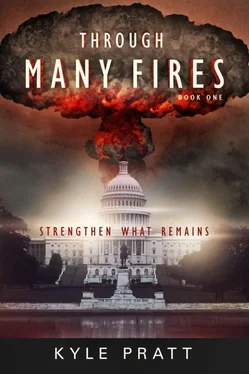“Hello. How are your injuries?” The doctor asked as she approached. “I meant to get back over and see you but,” she glanced around the ward, “it’s been hectic.”
“I can see you’re busy. The leg is fine.” Itches once in a while, but if I say that you might want to examine it.
“And your head? Any double vision…headaches.”
“No. I’m fine,” He looked at the beds scattered about the hall. “Were this many people from the area hurt?”
“Many are locals who were injured during the panic and looting along the freeway and in town before the blockade. Some have chronic illnesses like diabetes and HIV. They can’t get medicine now, so they come here. Others drove away from Seattle looking for medical care and found this place. We’re overwhelmed, but we try and help.”
A nurse called to her.
“I’ve got to go.”
“Oh, before you do. I need to find Sheriff Hoover. Do you know….”
She pointed. “Down this hallway and take the first left. Ask at the nurse’s station.”
As soon as he turned the corner, Caden saw the sheriff’s tan uniform at the end of the hall. As he approached he saw Hoover staring through a large window into a room. Inside a gray-haired woman lay in a bed surrounded by people. “They told me you were here to see your mother. Is she okay?”
Hoover glanced in Caden’s direction, shook his head, then returned his gaze to the room. “She had a heart attack the day of the Seattle blast and has barely hung on since. Some people have lost the will to live. I’m afraid she is one of them. Half of those in the senior home are dead from shock, stroke, heart attack, neglect or….” He shrugged.
“Your mom isn’t that old and she has family.” He gestured toward those in the room and was suddenly embarrassed. Hoover knew his relatives, but Caden wasn’t sure who these people were. “They’re family—right?”
“Yeah,” he pointed, “Dad, my uncle Jim, Aunt Carrie and,” he gestured toward a woman coming down the hall, “you remember my sister.”
Caden turned. “Debra?” It had been ten years since he had last seen her, but instead of the slender high school girl he remembered, a much heavier woman stood before him. But the surprise came from more than that. There was too much makeup, too much jewelry, and way too much cheap perfume.
“Well, hello,” she said and popped her gum. “I heard you were back in town.”
Caden smiled. “Hello, it’s nice to see you again.” He glanced at the sheriff and knew there would never be a way to express it, but he was now, and would forever be, grateful that Hoover had arrested them that night at the graduation party before anything happened.
Small talk ensued for a minute then Caden said to the sheriff, “I need to discuss something with you. Together they moved to a corner next to a storage closet.
“There is no easy way to say this so here it is, I think civil war is coming to America.”
Hoover blinked and stared off into the distance for several moments. “Does this have to do with the Chinese and that treaty? I heard about that on the radio.”
“Yes, and the fight might come to Hansen.”
The sheriff banged his fist on the wall, and cursed. “Aren’t there enough problems?”
“We don’t want this fight. Durant is the one forcing it.”
“Tell me Mr. Military, what is going to happen here if your war breaks out?”
“It’s not my war. Hansen might be fine—I don’t know, but I’ve been ordered to stop any units loyal to Durant.”
Hoover shook his head. “And just how do you plan on doing that?”
A nurse hurried by.
“I can’t provide details here. Come up to the armory this afternoon and I’ll explain what I can.”
* * *
Three vehicles pulled to a stop in front of a small diner on a quiet Olympia street. Stepping from the middle vehicle Caden thought about home. Considering that a war might be coming, be grateful that I had a few hours off . That was what he had told Maria when, right after church, he had left for the armory and then straight on to Olympia, but the look on her face was not one of gratefulness.
“I’m surprised there are any restaurants open in Olympia,” General Collins said.
“Aren’t there any around the joint base?” Governor Monroe asked.
“One, but you pay a first-rate price for a third-rate meal and I have no idea where they get their food.”
A guard hurried from the lead jeep and opened the door as the trailing vehicle parked behind.
Stepping in, the Governor said, “This will be a decent meal for a five-star price. The family that runs this place purchases their food from local farms. They’re still able to do that, but they tell me that the cost is steep and rising.”
Caden noticed David Weston seated at a long table near the rear of the diner. He still had a bandage across his nose and bruises under his eyes, but thanks to the video and two area TV stations getting back on the air, he was now a local celebrity.
Three men sat across from David. When they turned, he recognized the state treasurer, secretary of state and the chief of the state patrol. After everyone shook hands, Governor Monroe sat next to Weston. Generals Collins and Harwich sat across from each other with Caden at the end of the table between them.
The restaurant was empty except for a man in a business suit sitting in the corner. His hair was dark with silver sprinkled throughout. Caden thought he might be part of the protection for the governor, but within moments of their arrival, he paid his bill and departed.
The waiter was soon at their table.
“Do you have coffee?” Weston asked.
“No, sorry, we ran out a few days ago.”
Recalling that he had some with breakfast Saturday, Caden wondered how much his dad had stashed away.
The waiter put on a big smile. Tonight we have chicken roasted with Herbs de Provence, garlic, onions and olive oil….”
Chicken or nothing. Well, it sounds like they tried to do something nice with it.
“…and we have new potatoes steamed with mint.”
Good.
“For vegetables,” he said in an excited voice, “we have corn or broccoli.”
Caden recalled how President Bush had banned broccoli from the White House. He had similar feelings. Corn it is. I’ll bet it’s canned. He was amused that despite the limited options it took longer for orders to be decided. He knew he was one of the lucky ones. Early on he had been able to buy enough food, water and gas. Now he lived on a farm surrounded by other farms. Selection might be limited, but he and his family would eat.
While the discussion continued, two of the soldiers came in and sat at a table near the door. One had a pistol and the other an M4. Caden assumed the other two were with the jeeps outside. He patted his holster. No one expected trouble tonight, but caution was prudent.
When the waiter had everyone’s order, Governor Monroe pointed to the soldiers by the door. “Get them whatever they would like.”
For the next hour, over a simple meal of chicken, corn and potatoes at a nondescript diner they discussed the likelihood of war and the future of the country.
As long as the discussion had been on policy and relief efforts Caden was engaged, but the subject had turned to the economy. He pushed his plate back as his eyes drifted to the soldiers by the door and their quiet discussion. The artwork on the walls and thoughts of home danced through Caden’s mind.
Weston’s phone chimed and he quickly pulled it from a pocket.
“That phone is official business,” Governor Monroe said to those around the table. Then in a hushed voice he added, “I think he keeps it on even when he showers.”
Читать дальше












